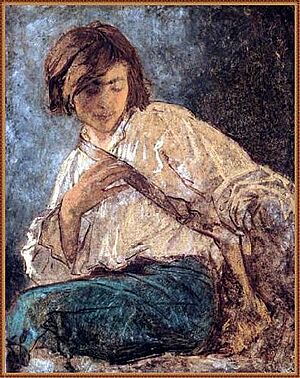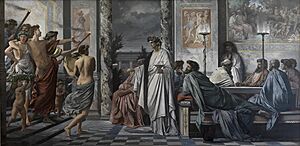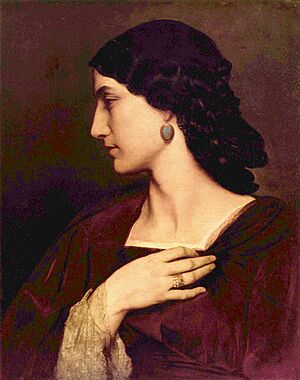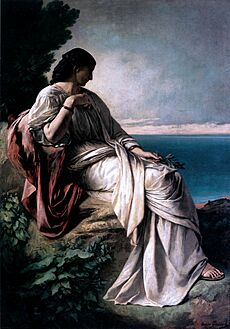Anselm Feuerbach facts for kids
Quick facts for kids
Anselm Feuerbach
|
|
|---|---|
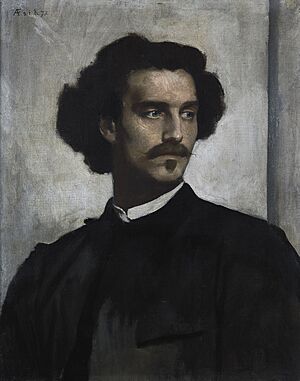
Self-portrait (1873)
|
|
| Born |
Anselm Feuerbach
12 September 1829 Speyer, Kingdom of Bavaria
|
| Died | 4 January 1880 (aged 50) |
| Nationality | German |
| Known for | Painting |
| Movement | Neoclassicism |
| Signature | |
Anselm Feuerbach (born September 12, 1829 – died January 4, 1880) was an important German painter. He was known as the top artist in the Neoclassical style during the 1800s in Germany. Neoclassicism was an art style that looked back to the art of ancient Greece and Rome.
Biography
Early Life and Studies
Anselm Feuerbach was born in Speyer, a city in Germany. His father, Joseph Anselm Feuerbach, was an archaeologist who studied ancient history. His grandfather was a famous legal scholar. The house where Anselm was born is now a small museum.
Anselm started his art training early. From 1845 to 1848, he studied at the Düsseldorf Academy. He then went to the Munich Academy. In 1850, he moved to the academy in Antwerp, Belgium. In 1851, Feuerbach went to Paris, France. There, he learned from a teacher named Thomas Couture until 1854. While in Paris, he painted one of his first important works, Hafiz at the Fountain (1852).
Time in Italy
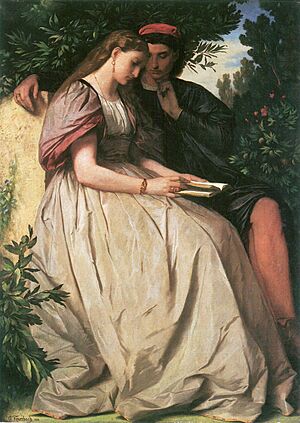
In 1854, a rich supporter, Grand Duke Friedrich of Baden, helped Feuerbach travel to Venice, Italy. In Venice, he was very impressed by the colorful paintings of the old Italian masters. Many of his later paintings show how much he learned from them.
From Venice, he traveled to Florence and then to Rome. He stayed in Rome for a long time, until 1873, only making short trips back to Germany. While in Rome, he met Anna Risi in 1861. She became his main model for four years. Later, in 1866, Lucia Brunacci became his model. She posed for his famous paintings like Medea.
In 1862, Feuerbach met Count Adolf Friedrich von Schack. The Count asked him to make copies of old Italian paintings. Through the Count, Feuerbach also met two other artists, Arnold Böcklin and Hans von Marées. These three artists were known as the Deutschrömer, which means "German Romans." This name was given to them because they preferred Italian art over German art. Between 1869 and 1874, Feuerbach painted two versions of his well-known work, Plato's Symposium.
Later Career and Legacy
In 1873, Feuerbach moved to Vienna, Austria. He became a professor of history painting at the Academy of Fine Arts Vienna. Some of his students later became famous artists themselves.
While in Vienna, he painted a large mural called The Fall of the Titans for the new academy building. He also became friends with the famous composer Johannes Brahms. After Feuerbach passed away, Brahms wrote a special music piece called Nänie to honor his memory.
Last Years
In 1877, Feuerbach left his teaching job in Vienna. He moved back to Venice, where he died in 1880.
After his death, his step-mother, Henriette Feuerbach, wrote a book about him. It was called Ein Vermächtnis ("A Legacy"). The book included his letters and notes about his life. It became very popular and helped people remember his art.
Feuerbach's paintings are known for their calm and dignified style, similar to ancient Greek art. He believed that good painting skills were very important to show even the greatest ideas. His works can be seen in major art galleries across Germany. For example, the second version of Iphigenia is in Stuttgart. Dante at Ravenna is in Karlsruhe. Medea is in Munich, and The Concert, his last important painting, is in Berlin. Other famous works include The Battle of the Amazons, Pietà, Orpheus and Eurydice, and Ariosto in the Park of Ferrara.
See also
- List of German painters
 | Georgia Louise Harris Brown |
 | Julian Abele |
 | Norma Merrick Sklarek |
 | William Sidney Pittman |


